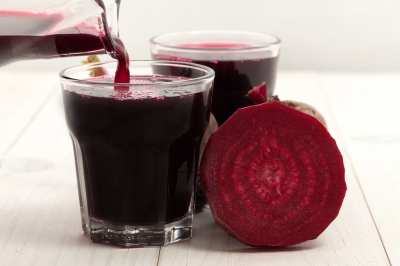Increase Nitric Oxide and Decrease Blood Pressure with Beetroot Juice
 There are many heart disease risk factors, such as high blood pressure and high cholesterol, associated with low nitric oxide levels.
There are many heart disease risk factors, such as high blood pressure and high cholesterol, associated with low nitric oxide levels.
Nitric oxide has many bodily functions, include vasodilation of blood vessels to govern blood pressure.
It was previously believed nitric oxide was only produced via oxidation of L-arginine, an amino acid, in the presence of oxygen. New research has confirmed a second pathway for increasing nitric oxide levels. This second pathway is the conversion of nitrates to nitrite to nitric oxide.
Vegetables are a source of nitrates.
Approximately 85% of dietary nitrate comes from vegetables. The remaining 15% from drinking water. When you consume dietary nitrates, they are absorbed in the stomach and small intestine. Of the ingested nitrates, about 25% is extracted by the salivary glands and concentrated in saliva. It is an enzyme on the surface of the tongue that converts nitrate to nitrite. When the nitrite in saliva is then swallowed it is converted to nitric oxide by the acidic environment of the stomach.
To restate: Nitrate in food becomes nitrite in saliva which then converts to nitric oxide in the stomach.
Nitric oxide obtained from dietary nitrate sources, such as vegetables, provides an alternate treatment plan for increasing protective nitric oxide levels.
Researchers studied the effects of 0.5 L of beetroot juice on blood pressure. They found both systolic and diastolic blood pressure to reduce when plasma nitrite hit peak levels about 3 hours after beetroot juice consumption.
Beetroot juice is not only a rich source of nitrates, it also provides betaine, antioxidants, and polyphenols. For this reason, it’s not conclusive whether or not the blood pressure reduction is due to nitrate content alone. Betaine, antioxidants, and polyphenols also play a role in cardiovascular health.
Effects eliminated if you spit out saliva after ingesting.
Your saliva plays a key role in nitric oxide production. If you spit saliva after consuming beetroot juice, you prevent nitrite-rich saliva from reaching the stomach. This means no reduction in blood pressure levels was seen in subjects who spit out saliva after consuming the beetroot juice.
Nitrate levels in vegetables
Nitrate levels vary greatly in vegetables and are dependent on many factors, such as humidity, temperature, sunlight exposure, herbicides, fertilizers, and water. To deliver consistent levels of nitrates to study participants, researchers used “Beet It” organic beetroot juice. “Beet It” delivers 5.5 mmol of nitrate per half liter.
The DASH diet to lower blood pressure provides approximately 20 mmol of nitrates per day. For comparison, this is similar to the nitrate level supplemented via beetroot juice in recent research.
Don’t drink out of the bottle
If you decide to use nitrate-containing vegetable juice as a method to lower blood pressure, you need to avoid letting the bacteria that convert nitrates to nitrates contaminate the juice. High levels of nitrite may accumulate which can potentially be harmful. In other words, don’t let your saliva get into your main juice bottle. Use a glass.
Avoid supplements
This isn’t a place where I encourage you to use nitrate supplements. Stick with what we know is safe and does not have potential negative consequences…dietary nitrate from vegetables or vegetable juices.
If you have cardiovascular disease or cardiovascular risk factors, discuss with your doctor before starting a high-nitrate diet. You also want to be aware of any medications that might adversely interact with diet changes.
Vegetable sources of nitrate
Beetroot juice is a quick and easy option, but doesn’t necessarily taste good to everyone. Leafy green vegetables, Chinese cabbage, endive, fennel, kohlrabi, leek, celery, cress, chervil, lettuce, spinach, and arugula are additional options.
1 cup raw spinach = 90 mg of nitrate
1/2 cup cooked collard greens = 200 mg of nitrate
1 cup raw leaf lettuce = 100 mg of nitrate
1/2 cup vegetable juice = ~40 mg of nitrate
Research suggests you need between 300 to 500 mg of nitrate to lower blood pressure.
You may access the free e-course 7 Natural Ways to Lower Blood Pressure at http://lowerbloodpressurewithlisa.com.
All the best,
Lisa Nelson RD
Health Pro for HealthCentral
Image courtesy of phasinphoto / FreeDigitalPhotos.net



